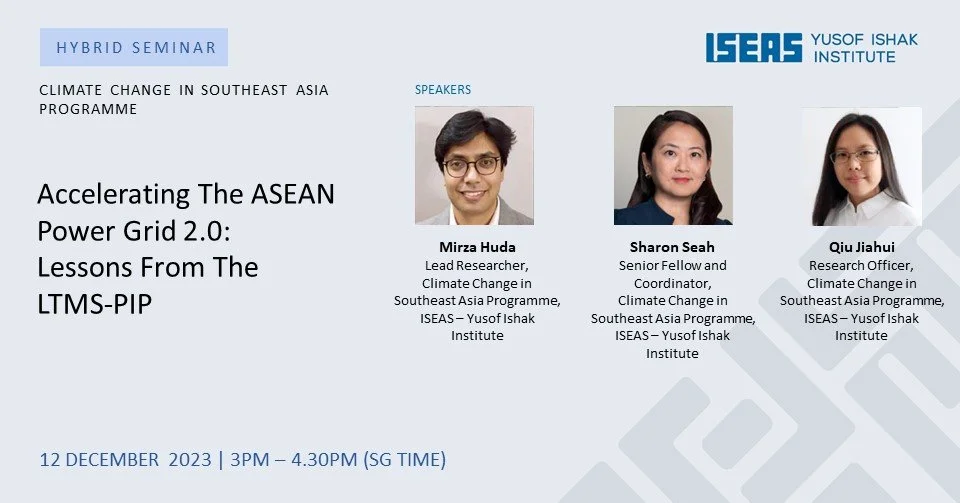Organizer: ISEAS - Yusof Ishak Institute
Type/Location: Hybrid, Singapore
Description:
There is growing momentum in the region towards greater energy interconnectivity since the commencement of the Laos-Thailand-Malaysia-Singapore Power Integration Project (LTMS-PIP) in June 2022. The term “pathfinder project” has been widely used to describe the LTMS-PIP, the ASEAN region’s first foray into multilateral cross-border electricity trading. A “pathfinder” is one who ventures ahead and discovers a path for others to follow—and the LTMS-PIP plays this role not only by demonstrating the real-world application of regional power trading in ASEAN, but also through the experiences gained by the countries in the planning and implementation of this project. These experiences will prove crucial to upcoming power interconnection projects such as the Brunei-Indonesia-Malaysia-Philippines Power Integration Project (BIMP-PIP) and as ASEAN countries forge ahead towards their long-standing vision of the ASEAN Power Grid (APG): an integrated regional electricity grid system which would bolster energy security, improve access to electricity as well as meet national climate targets.
While the APG initiative has been around since 1999, recent years have seen many new proposed interconnection projects underpinned by emphasis on renewable energy, growing investor interest, and the use of technology such as subsea cables, smart grids and energy storage systems – leading some to term the region’s next steps as the “APG 2.0”. ISEAS researchers conducted an extensive review of the best practices, challenges and lessons gleaned from the LTMS-PIP experience, engaging directly with key energy and climate stakeholders in Lao PDR, Thailand, Malaysia and Singapore. In this hybrid seminar, they will present a newly published policy report which synthesizes and draws recommendations from these findings for the development of the APG 2.0.
About the Speakers
Dr Mirza Huda is Lead Researcher at the Climate Change in Southeast Asia Programme (CCSEAP) of the ISEAS–Yusof Ishak Institute. He contributes to CCSEAP projects on energy, climate change and natural resource governance in Southeast Asia. His work focuses on energy transition and climate change in Southeast Asia, the European Union’s (EU) Carbon Border Adjustment Mechanism (CBAM) and cross-border electricity grids in Asia. Prior to ISEAS, Mirza worked at the Lee Kuan Yew School of Public Policy, the Organization for Security and Co-operation in Europe (OSCE) Academy and the Nanyang Technological University. He also provided consultancy services as an Energy Security Expert to the Office of the Co-ordinator of OSCE Economic and Environmental Activities (OCEEA), Vienna. Mirza received the 2020-2021 Clean EDGE Asia Fellowship sponsored by the National Bureau of Asian Research and the Bureau of Energy Resources at the U.S. Department of State. He is a Research Fellow at the Earth System Governance Project. Mirza has published in International Affairs, Environmental Research Letters, Geopolitics, Energy Policy, Energy Research and Social Science and Geoforum, among other journals. He completed his PhD on International Energy Cooperation from the University of Queensland, where he was supervised by Saleem Ali and Matt McDonald.
Ms Sharon Seah is Senior Fellow and concurrent Coordinator of the ASEAN Studies Centre and the Climate Change in Southeast Asia Programme at the ISEAS – Yusof Ishak Institute. Prior to academia, Ms Seah spent 15 years in the Ministry of Foreign Affairs of Singapore and the National Environment Agency. Her research interests are in ASEAN, multilateralism, rule of law, and climate change. Ms Seah graduated with a Master in Public and International Law from the University of Melbourne in 2018. She is co-editor of 50 Years of ASEAN and Singapore (World Scientific: 2017), editor of Building a New Legal Order for the Oceans (NUS Press: 2019) by Tommy Koh, and co-editor of the Cities and Climate Challenges in Southeast Asia Compendium (ISEAS Publishing: 2023). She is also the lead author of The State of Southeast Asia Survey Report and the Southeast Asia Climate Outlook Survey Report.
Ms Qiu Jiahui is a Research Officer in the Climate Change in Southeast Asia Programme at the ISEAS – Yusof Ishak Institute. Her research interests are in climate ambition (through the study of ASEAN countries’ Nationally Determined Contributions), climate finance flows, methane emissions and abatement and urban ecosystem services. Her articles can be found in publications such as CNA, The Business Times and Eco-Business. She was a co-editor of the Cities and Climate Challenges in Southeast Asia Compendium; as well as a co-author of the annual Southeast Asia Climate Outlook Survey Reports (2020-present) and the policy report Planning Southeast Asia’s Decarbonisation Pathways. She holds a Bachelor of Environmental Studies from the National University of Singapore.
To register, click here.

